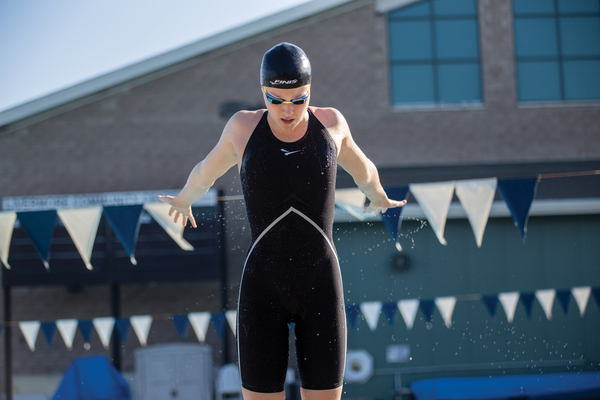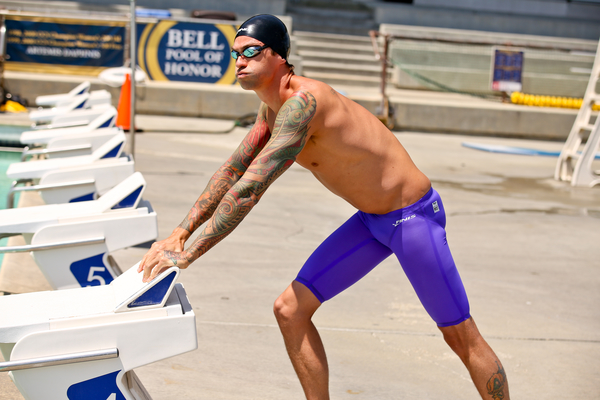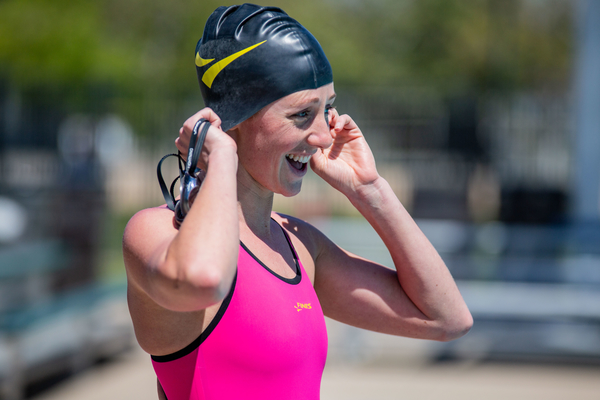The Key to Unlocking Your Speed: A Positive Mindset
June 05, 2018
We’ve all had that race where we’re standing begrudgingly behind the blocks, thinking about how we’d rather be doing anything other than swim this race. To make matters worse, the swimmers to your left and right appear to be geared up and ready to battle. You begin to tell yourself that there is no way you are going to keep up with them.
People experience negative thoughts every day, whether consciously or subconsciously. But when swimmers entertain those negative thoughts, they have unknowingly sentenced themselves to performing far less than their best. So how do you harness and retrain your thoughts to make significant improvements in your performance? Read on to find out!
Why Your Mindset Matters

A positive mindset is arguably one of the most important tools for a swimmer to develop. Training, talent, and genetics can only take a swimmer so far. According to Coach Kyle Elmendorf, “Talent can win you games, but character and attitude win championships. Coaches would rather invest their time in athletes who are motivated, coach-able, hard-working, disciplined and great teammates over a selfish group of talented athletes.”
Your mindset ultimately determines your result, whether in practice or in a race. The swimmers who stay positive in practice are setting themselves up for success. Positive swimmers are ready for anything that is thrown at them, whether their goggles fall off during the start or they swim a personal best.
National champion gymnast, three-time All-American and Hall of Fame athlete Kirk Mangoemphasizes this when he says, “The mental game side is all about what the athlete believes. This belief is what makes the biggest difference in how an athlete acts. Attitude and belief about what one can accomplish are essential to any possibility of achieving anything.”
Swimmers typically fall somewhere between the positive mindset and negative mindset. A mentally tough swimmer has a positive mindset and a mentally weak swimmer will have a negative mindset. You might be thinking, “What’s the big deal? Does it really matter if I’m negative versus positive if I get the job done?”
The answer is yes, and it makes a bigger difference than you think.
Effects of a Negative Mindset
A negative mindset plagues nearly all swimmers from time to time, as the constant wear and tear to your body is bound to take a toll. No one can stay positive all the time; we all have bad days! How the swimmer responds to those thoughts, however, is what counts.
A swimmer who is hit with negative thoughts before a race and allows them to take root and stay will under-perform. Negative thoughts create anxiety or fear inside of us. According to psychologist Dr.Laura M. Miele, Ph.D., negative thoughts cause mental blocks, lack of focus and/or preparation, less than desirable performances, tightening of muscles, and in some cases, injuries.
Dr. Jim Taylor addresses this further by adding:
Negative emotions can hurt performance both physically and mentally. They first cause you to lose your prime intensity. With frustration and anger, your intensity goes up and leads to muscle tension, breathing difficulties and a loss of coordination. It also saps your energy and causes you to tire quickly. When you experience despair and helplessness, your intensity drops sharply and you no longer have the physical capabilities to perform well.
Negative emotions can also hurt you mentally. Your emotions are telling you that, deep down, you’re not confident in your ability to perform well and achieve your competitive goals. Your confidence will decline… Also, since your negative emotions are so strong, you will likely have difficulty focusing on what will help you to perform well; the negative emotions draw your attention onto all of the negative aspects of your performance. Finally, negative emotions can hurt your motivation to perform because you just don’t feel good and it’s no longer fun.
A negative mindset tells us that failure is unacceptable. Wehn we are overwhelmed by these thoughts, we experience a barrage of emotions including fear, frustration, anger and helplessness. Focusing your energy on the task at hand becomes impossible and steals our joy in the sport.
Mental toughness trainer Craig Sigl also tells us that negativity turns your mind against your goals, even if you don’t intend for that to happen. He says that negative thoughts will come out victorious if we harbor them.
Where do negative emotions come from? Dr. Taylor says that they come from “baggage” from past races, experiences, etc. At first, negative emotions can boost performance because they cause a rise of intensity. However, if not properly dealt with, they will begin to cause more damage than help.
It is okay to be disappointed in a race – it shows you care – but don’t let yourself stay there!
How to Change Your Mindset

Here’s the good news: if you are reading this and realize your swimming is dominated by a negative attitude, you can make tangible steps toward a positive mindset! When you feel that first trickle of negativity, do not allow it to spiral out of control.
Ask yourself the following questions when you begin to beat yourself up about a bad race: “Am I being fair to myself right now? Am I blowing this out of proportion? Am I helping or hurting myself by thinking this way?”
Psychologist Dr. Kristi Pikiewicz, Ph.D., instructs us to reframe these thoughts and visualize a better outcome when faced with doubt and fear. Instead of feeding into and voicing negative thoughts by complaining, you learn how to control your reactions by finding a more constructive way of interpreting your situation.
Reframing causes you to shift your focus from factors that you cannot control to those you can. You cannot control what your opponent says or does, but you can focus on what you do. For example, Dr. Pikiewicz says when you are faced with thoughts like I’m too tired to speed up this last 50, you should reframe it by saying Relax – trust my training.
Visualization is a powerful tool with cognitive reframing. According to Dr. Miele, visualization and positive self-talk are a form of relaxation. When you picture yourself being successful and reaching your goals, your body responds to that. So next time you feel the self-doubt rising up, picture yourself accomplishing what you have set out to do. It will make a huge difference!
Make a goal. By concentrating on your end goal instead of thinking of how tired you are or how fast these people are ask yourself, “What time do I want?” or “What do I want my 50 split to be?” By concentrating on what you want your race to look like, you are taking concrete steps toward controlling your outcome.
Believe in yourself! You can achieve this. If you believe you are going to fail, you will – plain and simple.
Persistence is key. If you know that you need to make a change, don’t give up after a week. Keep working hard to change your thought pattern and train yourself to not worry about what is outside of your control.
Take a deep breath when you feel yourself responding to negativity coming from yourself or your teammates. Because anxiety and stress can inhibit deep breathing, focusing on breathing from your abdominal area will open up your airways. Dr. Taylor says that breathing deeply will help your body relax, feel better and feel more in control. These changes will naturally increase your confidence and enable you to perform well.
Smile! When you feel stress and don’t know if you can take anymore, smile. Even if you don’t feel like you can, do it. Smiling releases endorphins which cause your body to relax and feel happy.
Apply all focus to your race. You’ve been preparing for this moment and know what to do! Focus on yourself and no one else! You’ve already done all the training. Performance is oftentimes attributed to 10 percent physical training and 90 percent mental strength. Your self-talk matters!
Allow room for improvement. Instead of beating yourself up after a sub-par performance, think of at least one way you know you can improve (like faster flip turns) and train that aspect in practice. Each race is an opportunity to learn something. Develop a plan of attack and move forward!
The Power of a Positive Mindset

When you are positive throughout practices and meets, you are giving yourself a huge advantage. Dr. Taylor says that positivity allows you to enjoy the process. It helps us approach every challenge and love it. You will also begin to enjoy those high-pressure meets that used to scare you to death. Your confidence will naturally grow, insecurities will begin to melt away, and you will believe in yourself and those goals you swim for every day.
Positive thinking boosts performance and helps you feel more in control. While negative thinking leaves you feeling helpless and overwhelmed, positive thinking leaves you feeling confident, excited, happy and fulfilled. It also encourages your body to perform at its peak intensity while being relaxed and excited about the task at hand.
Not to say that positive swimmers don’t have bad swims from time to time – they do. But you won’t see them throwing their cap and goggles and pouting in the corner. They talk it over with a coach, analyze aspects to improve, and move on. Your response to those bad races determines how fast you will bounce back and achieve that time you’ve been working toward.
A positive mindset will help you to be calm and confident when it matters the most. How you respond to tough things will determine your success as a swimmer.
Recent Articles
Dylan Carter
Chelsea Hodges
Lorenzo Zazzeri

Introducing the Stability Snorkel Jr
Share on Social Media


